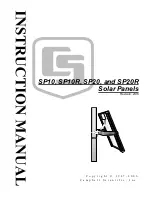
5
Mounting hole locations
quarter points
Ground mount:
Select the height of the mounting system to
prevent the edge of the lowest module being
covered by snow for a long period of time.
Also make sure the lowest module is placed
high enough so that it is not shaded by plants
or trees.
Roof mount:
When installing a module on a roof or
building, ensure that it is securely fastened
and cannot fall as a result of wind and snow
loads.
Observe prevailing safety regulations when
installing modules on roofs and buildings,
and use prescribed safety equipment (safety
nets, lifelines etc.).
Provide adequate ventilation on the rearside
of the modules. For proper operation and to
avoid damage from condensation, the mod-
ule requires an adequate flow of air across
the rear surface.
When installing the module, ensure that
there is sufficient distance between the rear
of the module and the mounting surface. The
minimum distance between the roof and the
modules should be 5 cm (2 Inches).
Pole mount:
When installing a module on top of a pole,
make sure the pole is strong enough to
withstand anticipated wind speeds and gusts
without substantial bending. The pole must
be installed with adequate foundations. Use
a mounting frame to fasten the module to the
top of the pole.
Roof Mounting
When installing modules on a roof, ensure
that the roof construction is suitable. In some
cases, a special support frame may be neces-
sary.
Caution
}
The roof construction and
installation may affect fire
safety. Consequently, it may
be necessary to use components such as
earth ground fault circuit breakers, fuses
and circuit breakers. An improper instal-
lation can create an additional hazard.
Please consult knowledgeable experts
regarding the installation.
}
When installing a module on a roof or
building, ensure that it is securely fastened
and cannot fall as the result of wind or
snow loads.
}
Observe prevailing safety regulations
when installing modules on roofs and
buildings, and use prescribed safety
equipment (safety nets, lifelines etc.).
Mounting hole locations
For secure installation use only the recom-
mended mounting locations on the modules.
Wherever possible mount the module using
the predrilled holes in the frame. The most
secure mounting is achieved by mounting
the module using the four “quarter” points as
shown.
For modules with a slot in the frame on the
rearside, use the quarter points for the most
secure mounting.
Seek advise from your dealer if you intend
to mount the modules without using the pre-
defined mounting locations in the frame.
Shell Solar will not honour the product
warranty if additional holes are drilled in the
frame.
Installing frameless modules
Shell Solar supplies two types of frameless
modules - one type provided with factory as-
sembled (pre-mounted) clamps for mounting
and pre-certified to IEC61215, the other type
provided without factory assembled clamps
and certified as a UL recognised component
[USA].
Shell Solar will only warrant products if they
are installed in mounting systems which
are IEC or UL certified. IEC requires mount-
ing systems to be certified together with
the frameless modules being used. UL must
approve of the mounting method being used
with a frameless module before full UL ap-
proval can be obtained.
For any other mounting method contact your
Shell solar representative for more information.
General Requirements:
}
Frameless modules are not suitable for
applications on vehicles, boats etc. for
mobile use.
}
Frameless modules shall only be used in
regions with moderate snow loads and
wind speeds up to 130 km/h. - Frame-
less modules are vulnerable to breakage
during transportation and installation.
Handle them with care.
}
No structures or objects that could touch
the module at its maximum permitted
flexure of 5 mm should be located in front
of or behind the module.
}
The deviation of the four mounting
surfaces from a plane surface must not
exceed 1.2 degrees.
}
The support surface at each mounting
position should have an area of at least
25 mm x 25 mm.


































